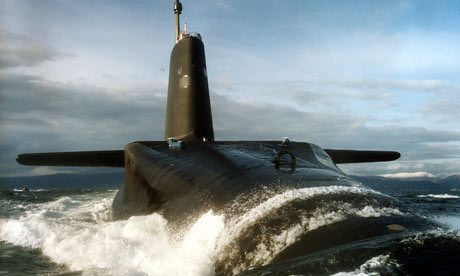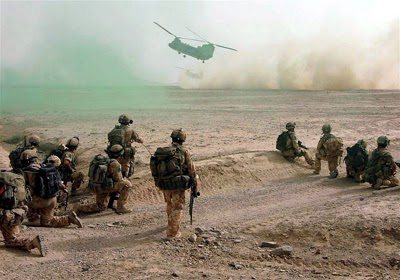Britain’s future as a nuclear-armed nation could be thrown into doubt if Scotland votes for independence on September 18, experts say, raising serious questions about its future status in the international community.
The UK’s Trident nuclear submarines are currently based at Faslane naval base on a sea loch west of Glasgow surrounded by dramatic mountain scenery.
But the Scottish National Party (SNP), leaders of the pro-independence campaign which is gaining ground in opinion polls, wants them out of Scotland by 2020 if there is a “Yes” vote.
Some say the cost and complexity of a move could force Britain to re-open the debate about whether it needs a nuclear deterrent at all.
“The Americans like us being a nuclear power — it would cause problems with them. In the NATO alliance it would cause alarm. Can you really remain a permanent member of the Security Council? I don’t know,” said Lord Alan West, head of Britain’s Royal Navy between 2002 and 2006 and an ex-security minister.
His view is shared by figures including Scottish former NATO secretary general George Robertson.
“The forces of darkness will simply love it,” Robertson said in April during a speech in Washington. “It might mean the unilateral nuclear disarming of the remainder of the UK.”
The SNP, Scotland’s ruling party led by First Minister Alex Salmond, describes Trident as “an affront to basic decency with its indiscriminate and inhumane destructive power.”
Despite the possible upheaval, Britain’s government says it has not done any contingency planning for relocating the facilities at Faslane and nearby Coulport, where warheads are loaded into missiles.
Any such move would be extremely expensive, potentially costing 8 billion Pounds (ten billion euros, $13 billion).
This comes against a backdrop of austerity in Britain, where this year’s military budget is 33.5 billion Pounds as ministers implement eight percent defence cuts in the four years to 2014-15.
“The defence budget couldn’t face that,” said West, adding that extra money would need to be found.
“There’s a distinct possibility that people could say you should just stop being a nuclear power.”
Other problems would include finding a suitable alternative site and the timing of the move, likely to take longer than the SNP’s deadline.
Professor Malcolm Chalmers of defence think-tank the Royal United Services Institute said: “Our estimate is that sometime around 2028 would be an appropriate time to complete the move.”
Aging submarines
Britain’s nuclear-armed status has underpinned its standing as a diplomatic power for decades.
Under a deal sealed at the height of the Cold War, the US supplies Britain with nuclear missiles.
While formally only the British prime minister can authorize their use, they are part of NATO’s collective deterrent.
President Barack Obama hinted at the importance of Trident to the US in July, saying he wanted Britain to remain “a strong, robust, united and effective partner”.
There are four submarines in the Trident fleet, at least one of which is on patrol somewhere in the world 24 hours a day.
But the Scottish independence vote comes at what is already a crucial moment in its history.
The submarines are aging and ministers will take the main decisions on replacing them in 2016.
Even within the British government, this is controversial. Prime Minister David Cameron’s coalition partners, the Liberal Democrats, want to end 24 hour patrols and procure one less submarine to replace Trident.
Despite the uncertainty, some play down the prospect of Britain giving up its deterrent anytime soon.
Chalmers said London would not want to give up such a symbol of international prestige after such a “major shock”.
“There would be a sense of humiliation in the UK, fears about how the UK is seen internationally, so it would be a big step to be seen to be giving up its nuclear force,” he said.











